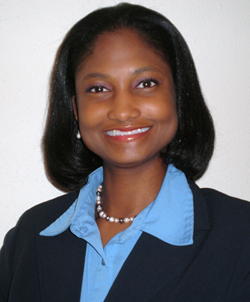Where are they now?
|
More AlumniKathryn BerlinAndres E. Carrillo Aleda Chen Krista Cline Katie Hill Gallant Megan Gilligan Kimberly Hurley Heidi IglayReger Jessica Kelley Seoyoun Kim Min-Ah Lee Mary Marshall Megan MacPherson Lauren Parker Lindsay Pitzer Markus Schafer Jori Sechrist Amber Seidel Tetyana P. Shippee John Spruill III April J. Stull Anusha Sundarrajan Roland J. Thorpe Kyle Timmerman Nicholas Turiano Lori Ward Oliver Wendt Lindsay Wilkinson Tim Wright |
April J. Stull, PhDDr. April Joy Stull is originally from Stone Mountain, GA and currently resides in Baton Rouge, LA. She received her B.S. degree in Family and Consumer Sciences with an emphasis in nutrition/dietetics (2001) and Registered Dietitian certification (2002) from Southern University A&M College in Baton Rouge, LA. She then attained her Ph.D. degree in Foods and Nutrition with a minor in Gerontology from Purdue University (2007). As a graduate student in the Center on Aging and the Life Course, she was actively involved on the Steering (graduate student representative) and Elder Mentorship Program (co-founder) Committees. Since then Dr. Stull has completed a National Institutes of Health (NIH) T-32 postdoctoral fellowship in Diabetes and Nutrition at Pennington Biomedical Research Center in Baton Rouge, LA. During her fellowship, she was honored with the NIH Postdoctoral Professional Development and Enrichment Award. This prestigious award recognized highly promising postdoctoral scientists that demonstrated research productivity. Currently, as an Assistant Professor at Pennington Biomedical, Dr. Stull’s laboratory focus is on botanical dietary supplementation and its impact on insulin resistance (i.e., pre-diabetes and type 2 diabetes). Specifically, she evaluated the effect of blueberries on improving insulin sensitivity in obese, insulin-resistant men and women and found that consuming blueberries for 6 weeks improved insulin sensitivity when compared to consuming a placebo. With the preliminary data generated from the clinical blueberry study, Dr. Stull wrote a grant and received funding from the NIH to continue her blueberry research. The overall research objective of this grant is to determine the underlying cellular mechanism(s) of action and therapeutic efficacy of blueberries and its bioactive component(s) in modulating insulin sensitivity in target tissues in vitro and in vivo. Also, Dr. Stull has published numerous articles in peer-reviewed scientific journals, presented scientific data nationally and internationally, and is actively involved in professional organizations and the community. What do you remember best about your time in the Gerontology Program?My fondest memories were taking Dr. Water’s interesting classes (very energetic professor), attending the gerontology symposiums and social events, and also being a part of the Elder Mentorship Program. The purpose of the Program was to formulate inter-generational ties between gerontology graduate students at Purdue University and the Elderly at Westminster Village in West Lafayette. This Program was very rewarding and I gained a friend / mentor (Mrs. Gwendolyn Stern) for life and we still keep in touch. Who were your mentors?At Purdue University, I had two mentors that played a significant role in my success today. Dr. Wayne Campbell, CALC faculty associate and professor in the Department of Foods and Nutrition, provided a breadth of experiences that helped develop and enhance my clinical and laboratory research skills. Dr. Dorothy Teegarden, professor in the Department of Foods and Nutrition, taught me to aspire, strive for excellence, and believe in myself. How did you get interested in gerontology?Dr. Wayne Campbell, my major professor and advisor, exposed me to the field of gerontology. Dr. Campbell’s nutrition and fitness research focused on the aging population. I became interested in attaining a minor in gerontology after assisting Dr. Campbell with some of his research projects and attending gerontology symposiums. What research experiences did you have at Purdue that helped form your current agenda?While at Purdue the majority of my research focused on appetite, food intake, and botanical dietary supplementation in an insulin-resistant older human population. I conducted all aspects of clinical trials which included research design, subject recruitment and medical screening, biological sample collection and processing, and data processing. These research experiences at Purdue provided me with the necessary skills to develop into a competent and competitive researcher. Currently, I am still working in the area of botanical dietary supplementation and insulin resistance which greatly affects the aging population. Anything else you would like to add?It is important for researchers in different disciplines to interact in order to fully understand the aging process. Purdue’s Center on Aging and the Life Course provides this type of synergy between researchers and also cultivates well-rounded students that eventually become competitive researchers. |
